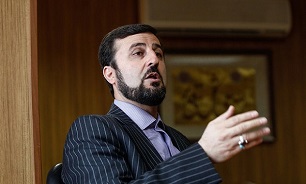IAEA report shows Agency’s full access to Iran nuclear facilities
 Speaking to reporters on Monday after the release of the IAEA’s latest report on Iran’s nuclear activities, Iran's ambassador to the UN nuclear watchdog, Kazem Gharib-Abadi, said the report "shows that the Agency still has full access in Iran, and despite Iran’s reductions to its JCPOA commitments for creating a relative balance between its rights and responsibilities, the IAEA is still able to carry out its verification of both the implementation and suspension of some parts of Iran’s commitments.”
Speaking to reporters on Monday after the release of the IAEA’s latest report on Iran’s nuclear activities, Iran's ambassador to the UN nuclear watchdog, Kazem Gharib-Abadi, said the report "shows that the Agency still has full access in Iran, and despite Iran’s reductions to its JCPOA commitments for creating a relative balance between its rights and responsibilities, the IAEA is still able to carry out its verification of both the implementation and suspension of some parts of Iran’s commitments.”
He went on to add, “from the moment the Agency notified Iran that it has some questions about a certain location, Iran agreed to a have a positive interaction with the IAEA in order to clarify the situation and address the relevant questions.”
“Iran gave the necessary access to the Agency in a fully cooperative and transparent manner,” he stressed.
Interaction between Iran and the IAEA on this issue is ongoing, he said, adding “any attempt to make prejudiced judgments and hasty and crude evaluations will be only interpreted as acts to deviate the course of this issue for political purposes.”
“While the two sides are cooperating to resolve the issue, political motives must not be allowed to take advantage of the situation and blow it out of proportion,” he added.
On a Monday report, the IAEA confirmed that Iran has begun enriching uranium at Fordow nuclear site, adding that Tehran’s enriched uranium stockpile has continued to grow.
The measure was part of Iran’s 4th step to reduce commitments to the JCPOA following the US’ unilateral withdrawal from the agreement, and the European sides’ failure to safeguard Iran’s economic interests in the face of US sanctions.
Tehran says the measures are all within the legal framework of the nuclear deal, stressing that the retaliatory measures will be reversed once other parties begin to live up to their own commitments.
Message end/
